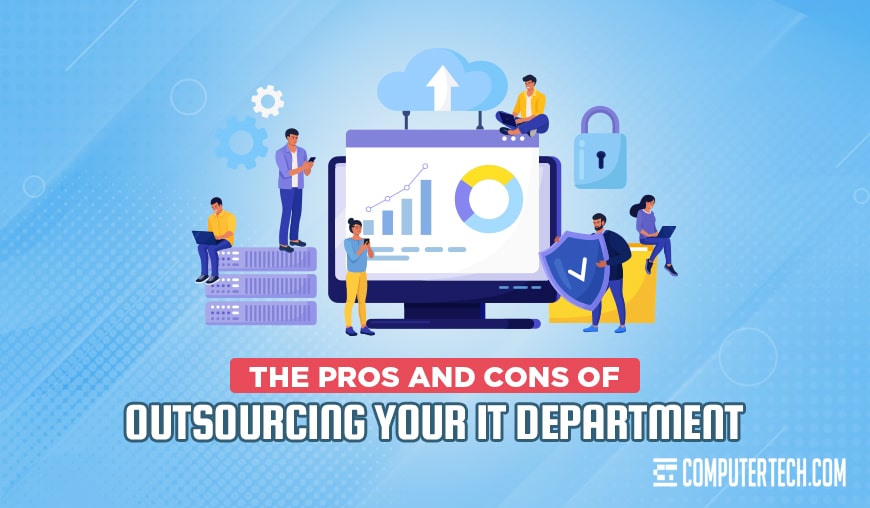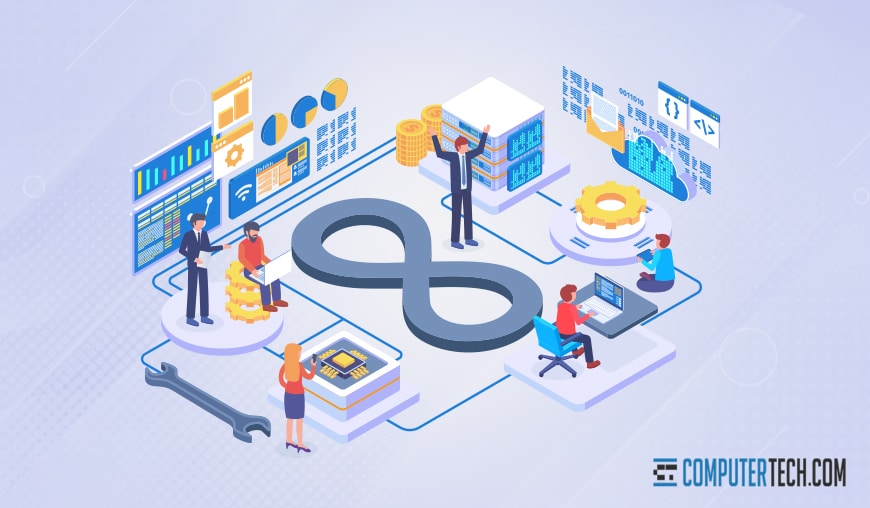-

Information technology is one of the most important fields in the world. We are a species that has come to rely on technology and computers to expedite and streamline our lives and businesses alike. We use it to communicate, conduct commerce, and escape reality.
Unfortunately, computers run the risk of failing like any device and require maintenance to continue their functionality for as long as possible. While large companies tend to have an IT department built into their infrastructure, this is not always ideal or preferred for other companies who either do not have the resources or the desire to build a department from the ground up.
To combat this, many successful corporations will outsource their IT needs to independent firms to handle their systems without directly funding the department. However, some companies question the value of outsourced IT departments. With this article, we hope to present the pros and cons of outsourcing your IT needs to one of these independent firms.
Pro: Cost Mitigation
Building a company from the ground up is a costly endeavor, especially since you have to consider potential growth, expansion, and upgrades as necessary. But, if you will pardon the pun, these costs are already incredibly taxing and only become more so when having to fund your own IT department. In addition, while certain corporate trends can take several years to change, technology changes almost annually. Therefore, to keep your IT department running, you will need to constantly update tools, technology, and staff to handle the newer aspects of what makes IT what it is.
In terms of cost, you will be spending hundreds of thousands of dollars or more on purchasing resources for the department, overhauling server rooms, and keeping job listings up to replace any staff who leave or supplement with specialists for new program types. In fact, the average company will spend anywhere between $4,000.00 to $27,000.00 per IT employee on their IT needs. These costs are only your responsibility when the IT department is an in-house department that you have built yourself. However, when outsourcing your IT needs, those costs are not your concern.

When outsourcing your IT needs, the firm you contract is responsible for updating its staff, server, and technology. This means that the only cost for your IT needs is the negotiated monthly or annual fee for their continued service. With this in mind, it will save you considerably to contract a third-party IT firm over building an in-house department yourself.
Keeping up with the larger corporations can be a genuine challenge if you are a smaller company, especially since you are likely unable to support employing so many new employees to staff and IT departments to keep your technology up and running. However, it is a simple lack of resources that outsourcing can correct. Specifically, outsourcing minimizes those costs and allows you time to build your company up before attempting to establish new divisions.
Con: Less Overall Control
While building your own IT department from scratch is a costly endeavor, it does benefit from more complete control. For example, when you create a new department in your company, you can dictate what types of hardware and software are used for specific tasks, what qualifications you want to see in the experts, and even the amount of server space dedicated to certain parts of the company. This complete control is often viewed as the main argument against outsourcing your IT needs to a third-party provider.

The reason is that third-party IT providers will have complete control over all the types of technology, software, and staff they use for the services they render. Therefore, you need to trust that they are using the people and tools best suited to the needs you have contracted them to provide. However, this lack of direct oversight can worry many companies who prefer to dictate the particulars of every department. Conversely, other companies prefer the hands-off approach, but putting that much trust in a third-party firm that you have minimal control over can be daunting.
However, this lack of control can generally be mitigated by ensuring the quality of the firm you contract. Additionally, this indirect control of the IT firm tends to prevent companies from stretching their management too thin.
Pro: Superior Remote Support
When dealing with an in-house IT department, odds are you will be sending your technicians and experts to the employee’s office dealing with technical issues. The reason is that having on-site technicians likely means you will be less enthused by programs that offer remote support when you can send your staff where they need to go. However, this can be more detrimental than you realize. When a computer suffers from an error that renders it inoperable for the employee’s specific tasks, there is a down period where they cannot perform the job you hired them to do. That downtime is only exacerbated by waiting for a technician to arrive on-site.
By outsourcing to a third-party firm that is not in-office, you might expect that downtime to be even worse since the technician’s office’s drive needs to be factored in. However, virtually any IT firm uses remote support software to diagnose and resolve software issues without an on-site technician. This means that the downtime your employees experience due to technical difficulties is reduced as a phone call is all it takes to get a technician working on the issue.

Let us say that you have an office operating out of Trenton, New Jersey, and one of your key employees’ computers stops working. Waiting for one of your in-house technicians to become available and travel from the IT department to the office of the aforementioned employee is valuable time being lost. However, suppose you have outsourced your IT needs to a 3rd party firm elsewhere in the state. They could connect to the employee’s computer, remotely control it as if they were sitting at the desk, diagnose the exact issue, and implement a fix with minimal downtime since the travel time is eliminated.
Con: Hardware Issues Might Require Longer Downtime
Software issues can generally be diagnosed and repaired remotely since all that is needed is for a technician to connect to the employee’s computer and control it on their own. However, hardware issues present a more difficult challenge for remote IT services. While software issues can be evaluated digitally, hardware issues require a technician to verify the status of the mechanical components, which cannot be done without being in the same room as the machine. This means that the benefits of remote support more or less go out the window if you are dealing with hardware issues rather than software.

Therefore, outsourcing your IT needs to an off-site firm can prove to be a mistake when hardware difficulties arise. When dealing with an in-house IT department, the wait involves a technician becoming available, being briefed on the situation, and the travel time from IT to your office. With an off-site third-party firm, the downtime is affected by the time it takes for the technician to travel from their firm to your office to find the afflicted employee.
The main saving grace is that hardware issues are generally easier to diagnose in most cases and do not always necessitate input from an IT professional.
Pro: A Wider Resource Pool
An in-house IT department will face one major issue in the limited talent pool they have to draw from when hiring experts. Generally, companies will attempt to hire local talent since the relocation of qualified employees can be a major hassle for many. However, this avoidance can lead to extremely valuable and talented professionals slipping through your fingers when they could just as easily be providing you with critical services. These hiring limitations are an issue that affects corporations across the country almost without fail. However, it is an issue that can be just as effectively avoided with the right tools.

While these issues are prevalent for in-house hiring, it is not an issue that outsourced assistance will necessarily have. When outsourcing for your IT needs, you employ everyone employed by that firm, and their talents will be at your disposal. For example, if you need someone who specializes in resolving cloud issues, the firm will undoubtedly have someone on staff who meets that need. If they do not have anyone available at the office closest to you, they will likely have employed a remote specialist who can be directed to aid you via the remote support service they offer.
Essentially, there are no limitations to the kind of IT experts that an independent firm will be able to retain. Once that firm has its talent, it becomes your talent once you have contracted the firm to render IT services.
Pro: 24/7 Helpline
One advantage an independent IT firm will have over an in-house IT department is the hours of operation. When operating your own in-house IT department, your IT employees go home at the same time as the rest of the staff and are not expected to work beyond their contracted hours. While reasonable, this can cause issues for those who prefer to burn the midnight oil and work late. When these nocturnal professionals face a technical issue and have no IT staff to call on, it can make their late-night efforts somewhat moot.
Fortunately, when it comes to outsourced IT services, you are more likely to find a firm that offers 24/7 services than not. With 24/7 service, you will have access to the specialists you need whenever you need them, especially for those firms that operate helpdesk services. In addition, by contacting the helpdesk of your contracted IT firm, any technical issues you are facing can be diagnosed and resolved regardless of the hour. This is possible since the independent firms can staff multiple specialists and divide their hours to compensate for clients in varying time zones.

While IT service is essential, not every company can support a 24/7 in-house service. So, when a third-party firm offers such a service for your company’s needs, outsourcing is more effective and attractive.
The Takeaway
There are advantages and drawbacks to every corporate resource used today. When dealing with something like IT services, the way you go about it can make or break your company’s success if computers are an essential tool. Deciding between building your own IT department from the ground up or outsourcing to a firm can be difficult, both financially and professionally.
However, at the end of the day, outsourcing has a wide array of benefits that have rendered it an extremely viable option for almost any company. In some cases, outsourcing is the best possible choice. However, the smaller a company is, the harder it is to establish an IT department yourself. This is especially true in a corporate climate that is becoming increasingly cutthroat with each passing fiscal year.

However, finding the right firm to outsource your IT needs to is the real challenge. You will need a firm that can offer all those benefits and a comprehensive repertoire of IT services essential to the work you will be doing. For that, we at Computer Tech would like to extend our services. We believe fully in offering top-level information technology services and helping to support your infrastructure and help you build it. So, if you are looking to outsource for your IT needs, contact us today and see how we can take your technology to the next level.
Additionally, if you have any comments, questions, or concerns regarding outsourcing your IT needs, or just IT in general, please feel free to reach out and contact us at any time! Figuring out what the best strategy is for your IT needs can be a bit of a challenging task, and you’ll want to be sure that you’re picking the best one for your situation. We would be more than happy to assist and answer any of those questions that you or your company may be having. We’re standing by and ready to help at a moment’s notice.
About The Author
Herman
Herman is the lead team member here at Computertech.com. He’s been in IT for over 20 years and has expertise in our various IT Services including Microsoft Azure, Microsoft 365, Microsoft Teams and even Computer Security.
No related posts.
IT Support | IT Services | IT Consultant | Computer Support
Speak to a Human (856) 347-2282
- Home
- About Us
- Services
- IT Support
- Managed IT Services
- IT Consulting and Strategy
- IT Security Services
- IT Infrastructure Services and Networking
- Help Desk and Onsite Support
- Communication and Collaboration
- Specialist IT Services
- Data Backup and Disaster Recovery
- Cloud Computing
- Optimizing Network Consulting Services
- Remote Monitoring and IT Management
- Business Computer Services and Consulting
- Blog
- Contact Us
Navigation- Home
- About Us
- » About Computer Tech
- » What To Expect
- Services
- » IT Support
- » Managed IT Services
- » IT Consulting and Strategy
- » IT Security Services
- » IT Infrastructure Services and Networking
- » Help Desk and Onsite Support
- » Communication and Collaboration
- » Specialist IT Services
- » Data Backup and Disaster Recovery
- » Cloud Computing
- » Optimizing Network Consulting Services
- » Remote Monitoring and IT Management
- » Business Computer Services and Consulting
- Blog
- Contact Us
The Pros and Cons of Outsourcing Your IT Department
In need of IT Services or IT Support? Call us today at (856) 347-2282
About Us
Computer Tech is an IT Consultant \ Computer Consultant firm providing Computer Support, IT Support and IT Services in South Jersey, IT Support North Jersey, IT Services Delaware, IT Services New Jersey, Philadelphia Pennsylvania.
(856) 347-2282Get started:
- 6 Things to Try if Your Work Laptop Won’t Boot Up
- The Ultimate Guide to IT Companies in New Jersey
- What is a Proactive IT Strategy and Why Do You Need One?
- How to Recover Data From a Broken Company Computer
- How NJ Businesses Are Outsourcing Their CIO and CTO Roles
- 8 Benefits of Using a Local New Jersey IT Company
- The Benefits of Managed IT Support Services for Businesses
- How Outsourced IT Support Can Help Employees Working Remotely
- [Guide] What Exactly Does an IT Support Company Do?
- Onsite IT vs Remote: How to Choose the Best for Your Business
Newsletter
Computer Tech, LLC.
105 Market Pl Suite 1, Glassboro, NJ 08028
(856) 347-2282
© Copyright 2025 HighTech Business Solutions. All Rights Reserved.



